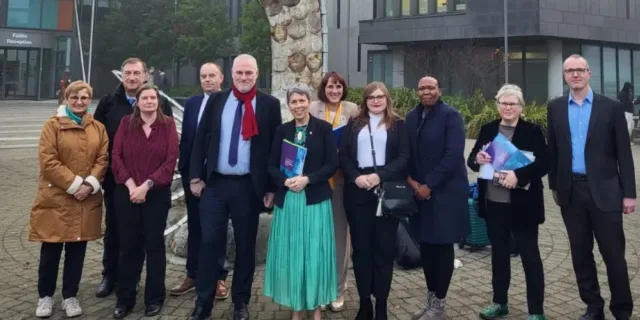ATU and DCU researchers to use innovative techniques to survey soil health in the north-west
Researchers at Atlantic Technological University (ATU) and Dublin City University (DCU) have received funding from the Environmental Protection Agency (EPA) to conduct the most comprehensive soil health assessment in the north-west of Ireland.

ATU researchers Dr Shane O’Reilly, in collaboration with Dr Sean Jordan and Dr Brian Kelleher at DCU, are carrying out this research in a bid to raise awareness of the critical role soil health plays in sustainable agriculture, environmental conservation, and regional development.
Agriculture in Ireland accounts for approximately 7%* of Ireland’s gross national income (GNI) and needs healthy soils. MMeSH, a research project which stands for Microbial and Metabolite based indicators for Soil Health, will use state-of-the-art scientific methodology to assess and monitor soil health. The researchers will work closely with farmers, the general public and national and international stakeholders during the project.
The project will collect an array of data, ranging from DNA and organic molecules analysis and identifying novel biosignatures to creating a map of soil microbial diversity. This data will be openly available online to deliver transformative insights and practical solutions for farmers, policymakers, and environmentalists.
If successful, the findings have the potential to reshape agricultural practices in the region.
Dr Shane O’Reilly, an assistant chemistry lecturer at ATU Sligo, expressing his excitement about the project, says: “Soil is a key natural resource that is often overlooked, and it’s commonly viewed as a non-living substance, routinely ignored, but nothing could be further from the truth. Soil is a thriving ecosystem that hosts many living organisms, from simple bacteria and fungi to earthworms, insects, and plants. All these organisms interact in a complex web of life, sharing, exchanging, and competing for resources that affect the soil’s overall health.”
Even though soil health is routinely monitored using basic indicators such as pH levels, organic matter content, and mineralogy, these indicators fail to show its complexity and how human activity directly and indirectly affects soil.
Dr Sean Jordan, Assistant Professor in Chemistry at DCU, says: ” Soil is underappreciated and understudied, yet it is one of the most complex materials on Earth. We will investigate and build a map of microbial communities in our soil using high-tech methods, and we hope to pinpoint how that affects soil health and if novel tests can be developed in the future for specific bio-indicators for soil health. All that will give us a more modern, state-of-the-art insight into how healthy our soil is and enable us to take care of it better.”
Welcoming the commencement of the project, EPA Programme Manager Dr Tara Higgins said:
“The EPA is pleased to fund this research by ATU and DCU which will enhance our understanding of soil ecosystems and soil health in Ireland. A key objective of our EPA Research Programme is to deliver evidence to inform decision-making. This research will provide important insights into how human activity directly and indirectly affects soil health, providing new evidence to inform future decision-making to protect and improve soil health.”
MMeSH project is a three-year project funded by the Irish Environmental Protection Agency (EPA).
Without soil, human life would be difficult. Soil is vital in the Earth’s ecosystem, so why is it often overlooked? Is it because it is understudied or because we often view soil as the ground beneath our feet? Get your answers in the ATU Podcast and find out more on the project social media @MMeSH_ATU and website.




